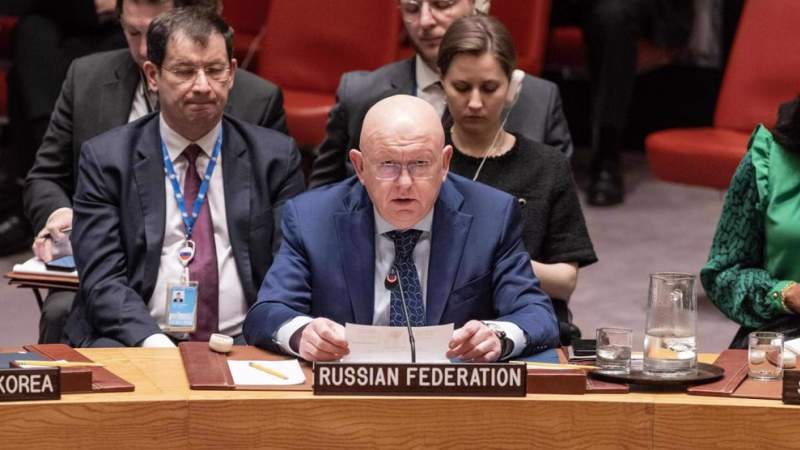Snapback Invocation Against Iran Lacks Legality, Breaches UN Charter: Russia

News- Middle East: Russia's ambassador to the United Nations, Vasily Nebenzya, says the reinstatement of the “snapback” mechanism of sanctions by certain Western countries against Iran lacks legality and is in contravention of the UN Charter.
Nebenzya made the statement in a long letter addressed to the UN chief and the Security Council’s rotating president after the 15-member body voted to reimpose sanctions against Tehran, which had been terminated under a 2015 nuclear deal between Iran and world powers, including Britain, France, and Germany — known as the European troika or E3.
The Russian envoy underlined that the so-called snapback mechanism was initiated despite all the energetic diplomatic efforts of the last two weeks and Iran's readiness to engage in finding a solution, as the trio states had “rejected all the compromises and chose an escalatory path.”
“The claims by E3 that the ‘snapback’ mechanism was triggered do not withstand any scrutiny, as these States did not follow the procedures for dispute resolution established by the Joint Comprehensive Plan of Action (JCPOA), being an integral part of resolution 2231. Moreover, numerous violations of these documents committed by the United Kingdom, France and Germany deprived them of the right to use the instrument prescribed therein. Hence, their ‘notification’ allegedly having triggered the ‘snapback’ is legally null and void,” Nebenzya said.
“The draft resolution put on vote on September 19 by the President of the Council undoubtedly did not meet the requirements of resolution 2231, and the outcome of its consideration cannot entail restoration of the UN sanctions against Iran. For that reason, the claimed ‘snapback’ procedure cannot be considered to be triggered.”
The Russian diplomat said since the Security Council did not adopt a resolution on the technical extension of UNSC Resolution 2231, then it will cease to be in effect in accordance with the termination day of the JCPOA on October 18, 2025, and after that, any restrictions and rules, including those relating to Iran's nuclear program, will cease to be relevant.
“Therefore, the Secretariat has no grounds for whatsoever undertaking any steps aimed at "re-application" of a number of Council resolutions that were terminated in accordance with resolution 2231 (2015), nor for renewing the relevant mandates,” Nebenzya said.
“I regret to underline that the actions undertaken by the Secretariat…lack any legal or procedural grounds and contradict the UN Charter,” he added.
The dispute over the so-called snapback mechanism goes back to the 2015 nuclear deal, under which Iran accepted confidence-building limits to its nuclear program in exchange for the lifting of UN, US, and EU sanctions.
The agreement was endorsed by UN Security Council Resolution 2231, which also set a timeline for the permanent expiration of nuclear-related restrictions in October 2025.
However, Iran repeatedly complained that the United States was reluctant to allow Tehran to benefit economically from the deal.
In 2018, Washington, under Donald Trump, unilaterally withdrew from the JCPOA and re-imposed sweeping sanctions on Iran.
In response, and after waiting over a year for the European parties to compensate for the US withdrawal, Tehran began gradually reducing its compliance with the nuclear limits in accordance with the JCPOA, while insisting it remained open to negotiations if sanctions were lifted.
The expiration of restrictions in October 2025 was meant to mark the conclusion of a decade-long nuclear dispute and the normalization of Iran’s nuclear status. But the E3 have sought to prevent this by invoking the deal’s dispute resolution mechanism, which could allow the restoration of anti-Iran sanctions if Tehran were found in violation of its commitments.
Iran maintains that its reduction of commitments was a legal and legitimate response to the US and EU failure to fulfill their obligations, and, therefore, the E3 are in no position to trigger the mechanism.
Russia, China, and certain other countries have backed Iran’s position, declaring that they do not recognize the restoration of anti-Iran sanctions.
Source: Press TV
#Iran #UN #Russia 25-10-01-
12:15
Israeli settlers attack Palestinians in Beit Ur Al-Tahta, west of Ramallah, injuring at least 7 Palestinians.
08:49
Palestinian sources: Renewed artillery shelling east of Al-Bureij camp in central Gaza
08:48
Frantz Lof: Without real improvement, Gaza’s residents will again face harsh winter conditions
08:48
Frantz Lof: Not a single health facility in Gaza is operating at full capacity
08:48
Frantz Lof: Humanitarian aid is barely arriving and is almost completely halted





